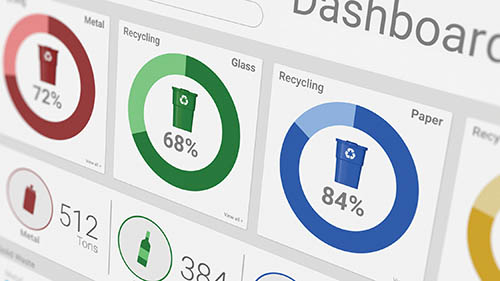— By Ray Hatch —
3 ways retailers and restaurants can get ahead of a potential recession and avoid greenwashing.
A possible recession, the risk of ESG-related litigation and allegations of greenwashing are troubling to navigate, making transparency and analytics a vital check and balance in today’s market. Whether you’re a retail grocer, restaurant executive or otherwise, investing in a waste audit and data reporting platforms are effective routes to avoiding the chopping block.

According to a recent survey from Deloitte, 49% of respondents said data and reporting helped them make more informed decisions, 16% said it better enabled their initiatives, and 10% said it improved their connections with customers and partners. Overall, 75% of respondents agreed that having data and reporting positively benefited their business.
Consider these three key waste management strategies to avoid any potential disruptions, boost efficiency and increase profit.
#1 – A Waste Audit Can Identify Existing Weaknesses Problem:
If recessions have taught us anything, it’s that they’re good at magnifying weaknesses. During economic downturns, businesses could discover operational inefficiencies such as:
• An overreliance on certain suppliers. Some suppliers may have environmentally harmful systems or packaging that could further complicate waste streams.
• Job responsibilities are expanding too much and diminishing quality output.
• Spending too much on employee training to ensure compliance.
Solution:
Studies show that companies that prioritize sustainability in their operations have the potential to emerge from a downturn stronger.

With a proper waste audit, companies can analyze relevant data to identify and address inefficiencies. Companies can see what’s being thrown away, what’s being recycled or diverted through other means, and the amounts of each type of waste by weight or volume.
A waste audit also helps identify the value a business may be losing and better helps increase profit. Landfill disposal can be more costly than a well-run recycling and reuse program. The extra weight increases the money needed for transportation and expands the carbon footprint, which more and more consumers want brands to fight against.
Consider a waste audit a jumping-off point to a more sustainable, operationally efficient and recession-ready approach.
#2 – Comprehensive Data & Reporting Leads to Better Decision-Making Problem:
Sustainability efforts ahead of a recession shouldn’t begin and end with a waste audit. Constantly accessing a business’s inputs and outputs through comprehensive, transparent data and measuring against the market helps decision-makers make more cost-effective decisions.
Decision-making during an economic downturn can be complex, so it’s best to determine the initiatives that will have the most impact now.
Every business has unique waste streams that require different needs. Companies should remain adaptable and alter their approach if necessary, as what may have revealed itself as a weakness during one waste analysis could be entirely different months later.
Solution:
Fortunately, waste and recycling handling partners are available to help retailers and restaurant owners by:
• Leveraging data and more accurately forecasting market trends.
• Uncovering insights on where materials come from.
– For example, should supply numbers be impacted and sought-after products be impossible to find due to a recession, businesses can reassess their waste to identify opportunities for repurposing it before it’s tossed — like organic food waste becoming compost for farms.
• Knowing how to avoid unnecessary inventory.
– A retailer can see how much of a product is being thrown away and measure it in the company or market as a whole.
#3 – Transparent Business Practices to Combat Greenwashing Problem:
According to a 2022 Fast Company study, 68% of executives admit that their company is guilty of greenwashing — a shady marketing gimmick intended to mislead customers who prefer to purchase services and products from environmentally conscious brands. Another poll found that well over half of business owners question if their marketing materials are genuine.
Today’s scrutiny uptick and prevalence of sustainability are bringing greenwashing to the front burner — making it all the more important to ensure what companies claim holds merit.
Solution:
Just as a waste audit, ongoing waste monitoring and access to data/reporting help companies thrive during economic complexities, the same strategies can equip executives with the information needed to avoid greenwashing.

For example, one company claims its product packaging is entirely recyclable. However, while the packaging may be 100% recyclable, most of the marketplace doesn’t have a collection system to allow it to be correctly captured. So, in reality, the packaging is going to the landfill.
A waste and recycling management company can help:
• Troubleshoot: By identifying the areas of success and regularly monitoring the collection of accurate data, executives can steer clear of potential liabilities.
• Plan: Evaluating a company’s performance makes it possible to identify paths to streamline systems and be most effective for sustainability goals.
• Justify: Quality and transparent data can catalog ways to reduce packaging materials without damaging products. It helps cut down on material usage, increases profits (because organizations can focus on their core business), and even gives companies a competitive advantage (as customers demand sustainability efforts from their brands).
To take advantage of these strategies, you must know how to get the most value from them. Companies relying on sustainability resources can weather tough times and minimize their legal risks.
So, why not have eyes better fixed on the ins and outs of your business?
— Ray Hatch is president and CEO of Quest Resource Management Group. He brings over 25 years of experience in both the waste management and foodservices industries. Previously, he served as president of Merchants Market Group, an international foodservice distribution company. He also served in various executive roles with Oakleaf Waste Management, a provider of waste outsourcing acquired by Waste Management.

